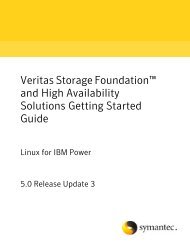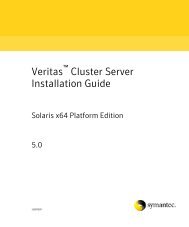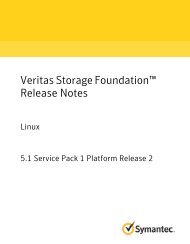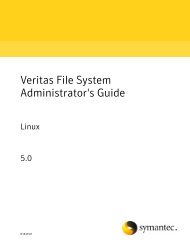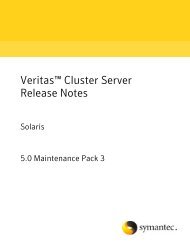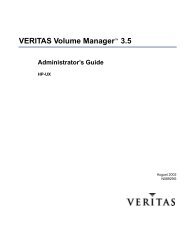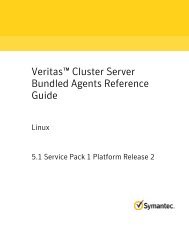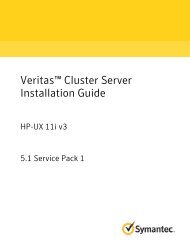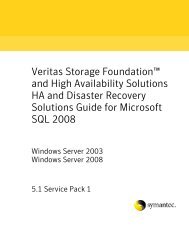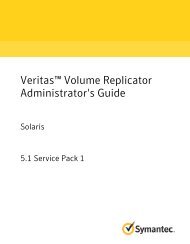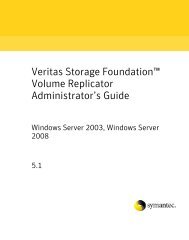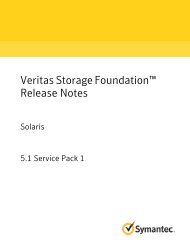Volume Replicator 5.0 Release Notes - Storage Foundation ...
Volume Replicator 5.0 Release Notes - Storage Foundation ...
Volume Replicator 5.0 Release Notes - Storage Foundation ...
You also want an ePaper? Increase the reach of your titles
YUMPU automatically turns print PDFs into web optimized ePapers that Google loves.
40 Third-party Legal NoticesThe licenses for most software are designed to take away your freedom to share and change it. Bycontrast, the GNU General Public Licenses are intended to guarantee your freedom to share and changefree software--to make sure the software is free for all its users.This license, the Lesser General Public License, applies to some specially designated softwarepackages--typically libraries--of the Free Software <strong>Foundation</strong> and other authors who decide to use it.You can use it too, but we suggest you first think carefully about whether this license or the ordinaryGeneral Public License is the better strategy to use in any particular case, based on the explanationsbelow.When we speak of free software, we are referring to freedom of use, not price. Our General PublicLicenses are designed to make sure that you have the freedom to distribute copies of free software (andcharge for this service if you wish); that you receive source code or can get it if you want it; that you canchange the software and use pieces of it in new free programs; and that you are informed that you cando these things.To protect your rights, we need to make restrictions that forbid distributors to deny you these rights orto ask you to surrender these rights. These restrictions translate to certain responsibilities for you ifyou distribute copies of the library or if you modify it.For example, if you distribute copies of the library, whether gratis or for a fee, you must give therecipients all the rights that we gave you. You must make sure that they, too, receive or can get thesource code. If you link other code with the library, you must provide complete object files to therecipients, so that they can relink them with the library after making changes to the library andrecompiling it. And you must show them these terms so they know their rights.We protect your rights with a two-step method: (1) we copyright the library, and (2) we offer you thislicense, which gives you legal permission to copy, distribute and/or modify the library.To protect each distributor, we want to make it very clear that there is no warranty for the free library.Also, if the library is modified by someone else and passed on, the recipients should know that whatthey have is not the original version, so that the original author's reputation will not be affected byproblems that might be introduced by others.Finally, software patents pose a constant threat to the existence of any free program. We wish to makesure that a company cannot effectively restrict the users of a free program by obtaining a restrictivelicense from a patent holder. Therefore, we insist that any patent license obtained for a version of thelibrary must be consistent with the full freedom of use specified in this license.Most GNU software, including some libraries, is covered by the ordinary GNU General Public License.This license, the GNU Lesser General Public License, applies to certain designated libraries, and is quitedifferent from the ordinary General Public License. We use this license for certain libraries in order topermit linking those libraries into non-free programs.When a program is linked with a library, whether statically or using a shared library, the combinationof the two is legally speaking a combined work, a derivative of the original library. The ordinaryGeneral Public License therefore permits such linking only if the entire combination fits its criteria offreedom. The Lesser General Public License permits more lax criteria for linking other code with thelibrary.We call this license the “Lesser” General Public License because it does Less to protect the user'sfreedom than the ordinary General Public License. It also provides other free software developers Lessof an advantage over competing non-free programs. These disadvantages are the reason we use theordinary General Public License for many libraries. However, the Lesser license provides advantages incertain special circumstances.For example, on rare occasions, there may be a special need to encourage the widest possible use of acertain library, so that it becomes a de-facto standard. To achieve this, non-free programs must beallowed to use the library. A more frequent case is that a free library does the same job as widely usednon-free libraries. In this case, there is little to gain by limiting the free library to free software only, sowe use the Lesser General Public License.In other cases, permission to use a particular library in non-free programs enables a greater number ofpeople to use a large body of free software. For example, permission to use the GNU C Library innon-free programs enables many more people to use the whole GNU operating system, as well as itsvariant, the GNU/Linux operating system.Although the Lesser General Public License is Less protective of the users' freedom, it does ensure thatthe user of a program that is linked with the Library has the freedom and the wherewithal to run thatprogram using a modified version of the Library.The precise terms and conditions for copying, distribution and modification follow. Pay close attentionto the difference between a “work based on the library” and a “work that uses the library”. The formercontains code derived from the library, whereas the latter must be combined with the library in order torun.TERMS AND CONDITIONS FOR COPYING, DISTRIBUTION AND MODIFICATION0. This License Agreement applies to any software library or other program which contains a noticeplaced by the copyright holder or other authorized party saying it may be distributed under the termsof this Lesser General Public License (also called “this License”). Each licensee is addressed as “you”.A “library” means a collection of software functions and/or data prepared so as to be convenientlylinked with application programs (which use some of those functions and data) to form executables.



